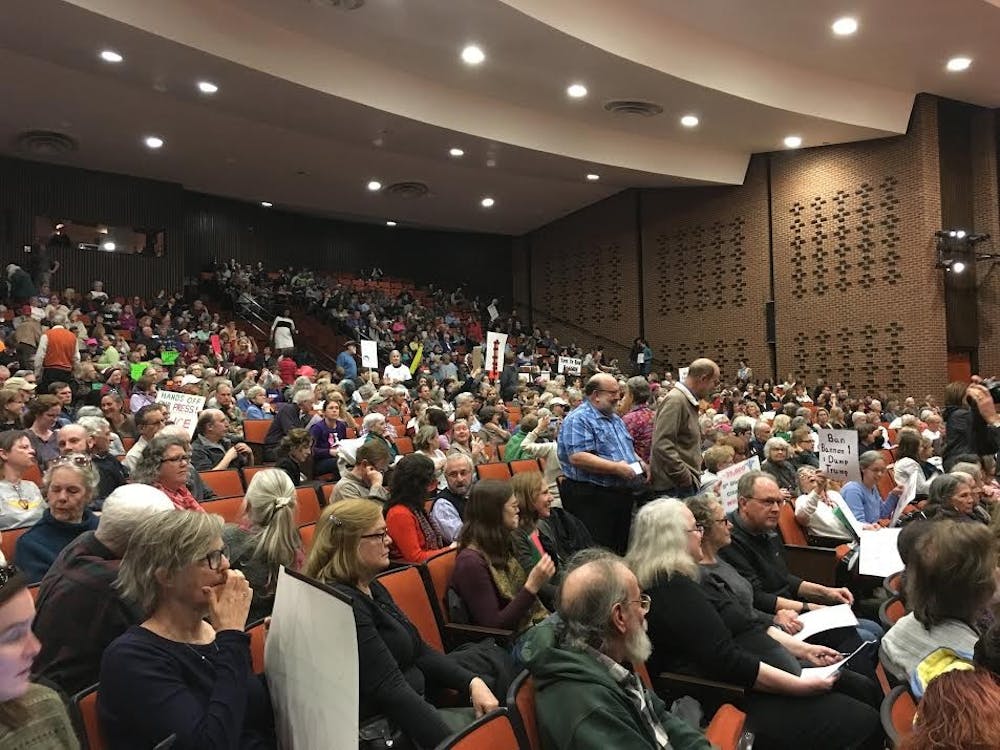Close to a thousand Charlottesville residents and Fifth District constituents packed into Charlottesville High School’s Martin Luther King Jr. Performing Arts Center to address concerns directed towards Fifth District Congressman Tom Garrett (R-Va.) Sunday afternoon.
While a number of men, women and children of all ages were in attendance, one person was noticeably absent: Garrett. The meeting was originally scheduled for Saturday, but due to Garrett’s travel schedule, it was moved to Sunday in hopes that he would be able to attend. Garrett declined the invitation.
“This is the last day of a week-long congressional recess,” Patrick Jackson of Indivisible Charlottesville said. “Typically, this week is used for representatives to meet with their constituents. Tom Garrett did not schedule a town hall meeting.”
As a result, Indivisible Charlottesville, a local group whose focus is resisting President Donald Trump’s agenda, partnered with several other organizations to organize “the people’s town hall,” Jackson said.
Attendees were visibly upset with Garrett’s absence, as demonstrated by an array of signs and chants questioning, “Where’s Tom?” throughout the event.
On Feb. 24, however, Garrett announced he will host two in-person town hall meetings — one in Charlottesville March 13 at 7 p.m. and one in Moneta May 9 at 7 p.m. The locations are yet to be determined.
“We are here to ask questions that deserve answers and tell stories that need to be shared,” Jackson said.
The event was moderated by Charlottesville High School students Kibiriti Majuto and Saad Khaleefa, both of whom are immigrants from the Democratic Republic of the Congo and Syria, respectively.
Health care, immigration and education were the three primary topics addressed at the meeting. Various speakers shared testimonies and stories related to each topic before attendees were given the opportunity to ask the moderators and Garrett questions.
The town hall was recorded, and organizers plan to send the questions asked to Garrett.
The first topic discussed was health care. According to Majuto and Khaleefa, Garrett plans to help repeal the Affordable Care Act.
Leslie Blackhall, a physician in palliative care at the University hospital, asked the first question regarding health care.
“Every one of my patients has a pre-existing condition,” Blackhall said. “I called Tom Garrett five times and every other Republican congressman in the state of Virginia and asked, ‘What are you going to do for my patients? How are you going to keep them from dying painful deaths? How are you going to help them get the care they need?’”
Other questions related to health care included how Garrett was going to focus on the health of citizens in the future and what Garrett himself has for a health care provider.
The second area of focus was immigration. The moderators noted Garrett’s tough stance on illegal immigration — Garrett said on his campaign website that he “will continue to oppose any benefits, incentives, short cuts, special programs, or any other action that rewards illegals for breaking the law.”
Tina Vasquez, an ESL teacher at Charlottesville High School, spoke about how immigration has impacted her life and the lives of her students.
“A lot of my students who don’t have papers have already talked about having to drop out of school and get a job to save up money to go back to their countries before they are deported,” Vasquez said. “Blocking people from coming into this country isn’t going to help in any way. This is a nation of immigrants.”
The final topic discussed was education.
Donna Price, an attorney, accused the Trump administration of trying to bring the education system “back to the days before Brown v. Board of Education.”
“When they say they want prayer in schools, they only want their prayers,” Price said. “When they talk states’ rights, that’s a euphemism for discrimination. I’m a transgender woman, and we need to protect all of our children in the schools.”
Charlottesville Mayor Mike Signer was one of the final attendees to speak.
“People have been saying this city is the capital of resistance, and people have been asking what that means,” Signer said. “This [event] is what that means. I am a very proud product of public elementary school, public junior high school, public high school and two public colleges.”
In late January, Signer declared Charlottesville “a capital of resistance” against the Trump administration.







